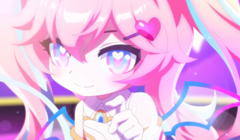As hostility towards feminist ideals grows in South Korea, female game developers face unprecedented backlash and harassment, prompting concerns about their safety and livelihood. Activists like Minsung Kim are rallying for support to combat these anti-feminist witch hunts and reclaim spaces for women’s rights.
Feminist Backlash: The Perils Facing Women in South Korea's Gaming Industry

Feminist Backlash: The Perils Facing Women in South Korea's Gaming Industry
The story sheds light on the escalating backlash against feminism in South Korea, highlighting the harassment and threats faced by women in the gaming industry like Darim.
It was a late night at her animation studio in South Korea when Darim finished designing a new character for MapleStory, a widely popular video game. Her pride in the work soon turned to horror after she posted the trailer online, only to be inundated with a barrage of abuse—death and rape threats flowed in from angry male gamers who misinterpreted a harmless hand gesture as a feminist insult.
The uproar stemmed from a fleeting frame in which the female character gestured with her thumb and forefinger close together, a movement reminiscent of a controversial sign once used by an online feminist community. “The insults were beyond disgusting; they felt inhumane,” Darim, a pseudonym, described the abusive messages that labeled her a feminist and demanded her termination.
The video game landscape in South Korea is increasingly shadowed by extreme misogyny, where a single frame or gesture can trigger ferocious witch hunts. Darim found herself another casualty in a troubling trend of online harassment, where women in the industry are relentlessly targeted for expressing feminist views. This antagonism has roots in a broader backlash against feminism, amid a gender discrimination climate that still prevails in the country.
Among the instigators of these witch hunts are young male gamers, who monitor female employees' actions with insidious attentiveness. They sift through social media accounts for incriminating evidence of feminism, amplifying public outrage that often forces companies like Nexon to retract their promotional materials. “These demands will never end; you need to nip this in the bud now,” remarked Minsung Kim, a concerned gamer who started an organization to support victims like Darim.
Minsung's support provided a lifeline, urging Darim's studio to withstand the onslaught and even offered to cover her legal fees. Though the studio eventually decided to fight back, many companies have capitulated in similar scenarios, showcasing an alarming trend where threats of boycotts from gamers lead to firings and restrictions on female expression.
The anti-feminist sentiment prevalent in South Korea is emboldened by political figures who deny systemic discrimination. Profound misogyny is pushed to the fringes, where women must navigate personal and professional spaces with caution. “Being vocal about feminism can feel perilous,” remarked a woman who has worked in gaming for two decades, commenting on the industry’s atmosphere.
As the backlash intensifies, women increasingly adopt what scholars term “quiet feminism,” concealing their beliefs in fear of reprisal, with statistics revealing a significant drop in the number identifying as feminists. Alongside personal attacks like the beating of a woman named Jigu, who was assaulted simply for her short hair, the physical danger women face adds another layer to this crisis.
Feminist advocacy groups are working to overturn the suffocating repression and seek legal reform, which currently lacks comprehensive protections against workplace discrimination based on gender. With gender equality efforts under threat, Minsung emphasized the need for companies and law enforcement to unify against the small yet loud minority of anti-feminist vigilantes undermining progress.
Jigu, who now identifies as a feminist despite her traumatic experience, expresses hope for supporting other victims: “I want to reach out to those like me—together, we can build strength.” As the tides shift within the gaming industry, the spotlight is increasingly cast on how to dismantle these harsh realities and allow feminism to thrive once more in South Korea.





















